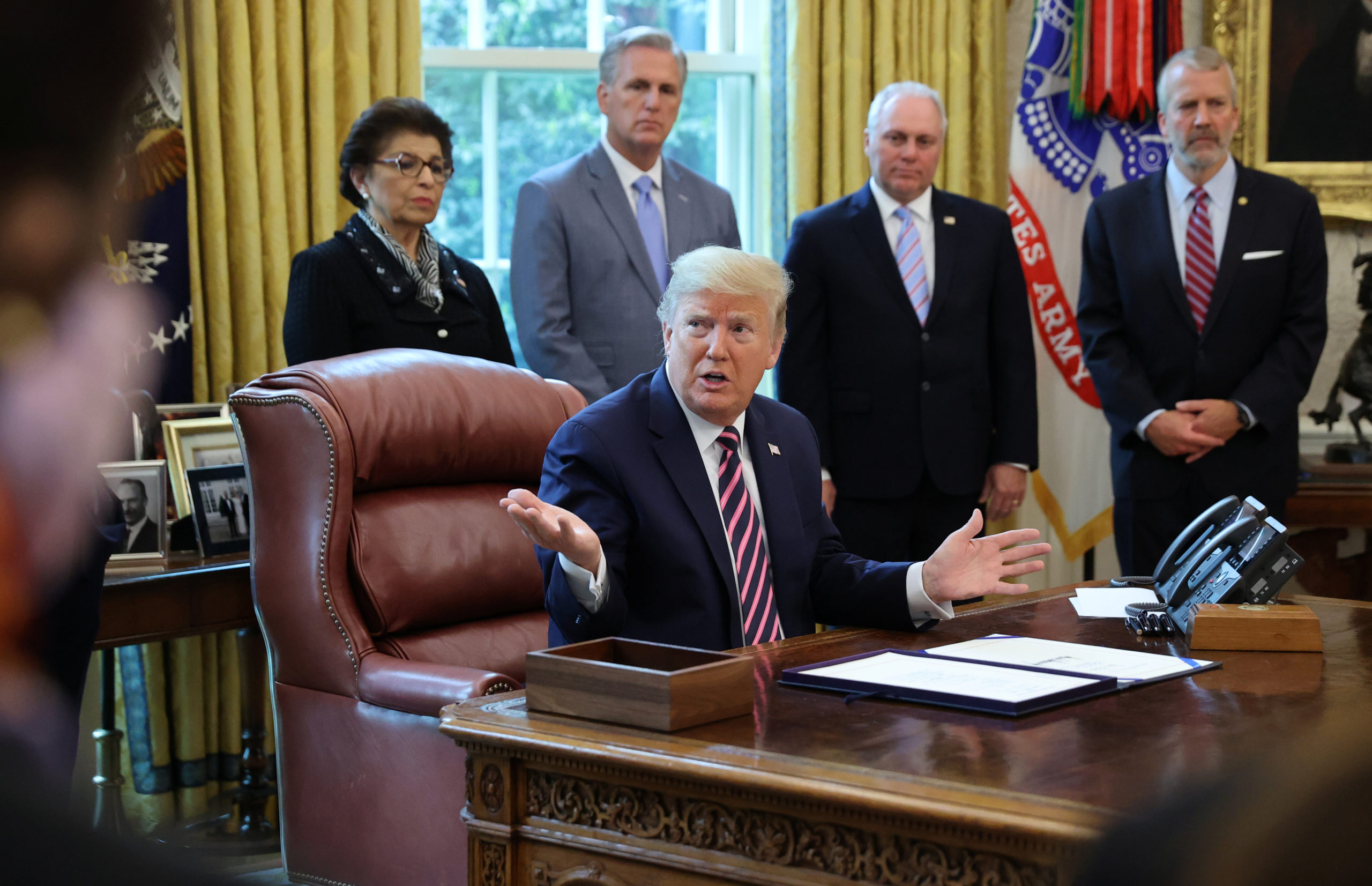Alaska senators blast banks for ‘discrimination’ as they halt Arctic oil and gas investments
On Friday, Senator Dan Sullivan sought support on the issue from President Trump.

Alaska’s U.S. senators are pushing back against banks that have vowed to stop financing new Arctic oil projects, calling such moves discriminatory — and appearing to receive some support from President Donald Trump on the issue — even as more banks announced restrictions.
The most recent development came Friday, in the Oval Office, as Trump was signing the latest version of the Coronavirus Aid, Relief and Economic Security (CARES) Act.
During the signing ceremony, Sen. Dan Sullivan spoke up, connecting the banks standing to benefit from that aid to the fresh restrictions on Arctic oil financing that he told the president “discriminate against a critical sector of the U.S. economy.”
“I don’t think they should be allowed to do that, sir,” Sullivan said.
“I like the idea of looking into that, you’re right,” Trump replied. “You cannot be discriminating against these great energy companies.”
It wasn’t immediately clear from the exchange what steps Congress or the White House might take to forestall new policies that limit Arctic investment.
[Suddenly, new investment in Arctic Alaska oil looks very unlikely]
Last week, two more American banks vowed to stop financing Arctic oil. First Citigroup and then Morgan Stanley announced they would not directly fund new oil and gas projects in the Arctic, including in the Arctic National Wildlife Refuge.
Existing projects in the Arctic region will require closer examination and senior management approval, Morgan Stanley said in a statement, and the company vows to be “prudent” in the transactions they do approve.
The banks join three other major U.S. financial institutions to back away from funding new Arctic energy projects in recent months: Goldman Sachs, JPMorgan Chase and Wells Fargo. The only major U.S. bank that has not issued such a declaration is Bank of America.

The recent announcements come amid record-low crude oil futures and the ongoing coronavirus pandemic, which has limited natural resource exploration and development.
On Friday, the Alyeska Pipeline Service Company imposed a 10 percent cut on oil deliveries in the Trans Alaska Pipeline System.
On Sunday, oil giant BP announced a negotiation of its deal to sell its Alaska assets to Hilcorp. The price remains the same at $5.6 billion, but it will be paid out over a longer timeframe, along with other changes made necessary by “market conditions,” William Lin, BP’s chief operating officer for upstream regions, said in a statement.
While the banks have vowed not to fund new exploration and development directly, they’re not cutting off existing relationships and projects — and there could be ways to fund projects indirectly as well.
But these announcements create more obstacles for oil and gas companies — especially smaller, newer ones without established relationships with the banks — to find funding for Arctic projects.
Alaska lawmakers also fear the new policies could affect responses to the pandemic and the oil-price crash.
If, for instance, banks are partnering with the Federal Reserve to offer business loans or other relief funding under the CARES Act, it’s not clear whether the banks would restrict funding for oil and gas initiatives in the Arctic.
“It would be contrary to the law as passed by Congress — in other words, illegal — for these banks to implement federal financing programs under the CARES Act in a way that disadvantages Alaska or companies who operate in the Arctic,” Sen. Lisa Murkowski, told ArcticToday in an emailed statement.
“These announcements are frustrating, disappointing, and undermine U.S. leadership in the Arctic,” Murkowski said, contrasting the move with advancing Arctic projects in Russia.
Meanwhile, conservation advocates have hailed the banks’ announcements as an important move away from investing in fossil fuels toward more sustainable options.
“Keeping destructive drilling out of the Arctic Refuge is critical to the survival and way of life of my people, and we are thankful that so many major banks are listening to us and taking our human rights seriously,” Bernadette Demientieff, executive director of the Gwich’in Steering Committee, said in a statement.
The U.S. federal government has a history of intervening to prohibit some forms of discriminatory lending.
When it comes to mortgages and housing, for example, lenders may not discriminate on the basis of race, ethnic origin, sex or religion. But choosing not to finance a natural resources project in a certain region based upon sustainability concerns does not seem to fall within such definitions.
The Trump administration has made opening the wildlife refuge up to resource exploration a key priority, although the process to do so has been fraught with delays and a contested environmental review process.
“We helped Alaska, but we really helped the United States with ANWR for Dan,” Trump said in the Oval Office, apparently referring to Sullivan.
“But ANWR’s perhaps the largest find in the world, right?” Trump asked. “It could be.”
There have been no announcements of oil discoveries in the refuge, and only one well has ever been drilled there — an exploratory well drilled in 1986 that at least one account deemed “worthless.”
The CARES Act has also drawn scrutiny for including Alaska Native corporations in emergency funding to address the coronavirus pandemic among tribal nations. These corporations frequently have significant investments in oil, gas and other natural resources in Alaska. The Arctic Slope Regional Corporation, for example, is the largest Alaska-owned company in the state.
Last week, the U.S. Treasury Department confirmed that Alaska Native corporations would be included in the funding, setting the stage for a legal battle.
But on Monday, a U.S. district court judge issued a preliminary injunction barring the Treasury Department from disbursing CARES tribal aid money to Alaska Native corporations.